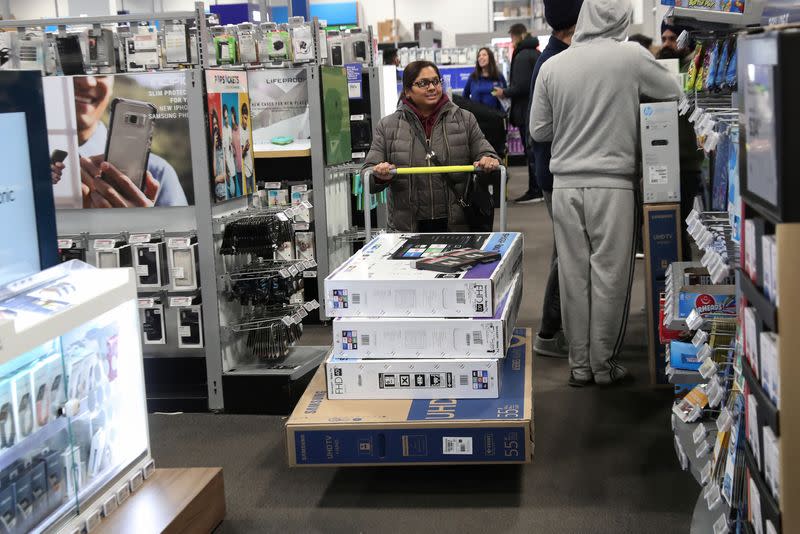TV upfront presentations clouded by digital video ad supremacy

By Dawn Chmielewski and Sheila Dang
(Reuters) - As television executives prepare lavish stage presentations in New York this week to dazzle advertisers during the annual TV upfront sales season, a harsh economic reality looms offstage -- digital video advertising now eclipses spending on traditional television ads.
The shift in spending and competition from tech players like Amazon has taken a toll on media companies' financial results, raising the stakes for the annual showcase of TV content to attract spending commitments from advertisers.
“We’ve definitely seen that audience erosion in linear TV in certain pockets -- especially more so in entertainment,” said Nicole McCurnin, director of advertising insights at ad tracking firm Guideline. “But I do see, broad strokes, ad companies’ attention is just going more so towards those digital platforms.”
Digital video refers to a broad category of TV alternatives that includes paid streaming services like Netflix, social video platforms such as TikTok, free ad-supported TV offerings like Pluto TV and cable replacement services including YouTube TV. It will account for an estimated $62.9 billion in U.S. ad spending in 2024, according to an April report from the Interactive Advertising Bureau and Guideline.
That represents 52% of the projected spending on video advertising this year, reflecting a change in viewing habits nearly two decades in the making.
Walt Disney, Warner Bros Discovery, Fox and Comcast's NBCUniversal all reported declines in domestic television ad revenue in the most recent quarter, though NBCU's exclusive streaming of an NFL Wild Card game on its Peacock service helped fuel revenue, offsetting those declines.
Many of the streaming services launched to capitalize on changing consumer viewing behavior "are still bleeding cash while declines in the traditional television business accelerate," said Richard Greenfield, media analyst at LightShed Partners. "They simply pivoted too late."
The fragmenting of the video landscape is well understood -- and media companies like NBCUniversal have developed new advertising tools that let marketers' messages ride along with their content, wherever it appears. For example, a T-Mobile ad featuring U.S. TV show "Saturday Night Live's" Chloe Fineman could air during the live network TV broadcast of “SNL,” appear the next day on NBCU’s Peacock streaming service and show up on social platforms like X, TikTok and YouTube.
“Regardless of where that person is who's in your target … you can go follow them, wherever they are,” NBCUniversal global advertising chairman Mark Marshall told Reuters. “The technology and capability just wasn't available until this year.”
Ahead of the upfront advertiser presentations, Disney and Warner Bros Discovery announced they would combine their Disney+, Hulu and Max streaming services this summer in a bundle of programming reminiscent of cable television. Such a combination might reduce subscriber cancellations and perhaps coax money-losing competitors to follow suit, analysts said.
“We view a re-bundling of traditional media content on streaming platforms as a key to making the space investable again,” wrote TD Cowen’s Doug Creutz.
Meanwhile, digital rivals Amazon and Netflix are hosting their own advertiser presentations in New York -- the Seattle retail giant, for the first time -- to capture shifting ad dollars.
Amazon launched ads within Prime Video for all customers in January, requiring users to pay for a higher-priced tier to remove ads. The move will boost Amazon's revenue and likely come at the expense of traditional TV companies' revenue, said Brian Wieser, a longtime ad industry analyst, in a March report.
Media companies are also tying up with tech giants to sell more ads. During a presentation to advertisers last month, Google announced that brands would be able to buy ad space with media companies like Paramount and Warner Bros Discovery through Google's automated tech tools, rather than working with salespeople.
"I think we're going to hear more about programmatic ... particularly as consumption shifts to the digital and streaming ecosystem,” said Samantha Rose, strategic investment lead at Horizon Media, referring to the upfront presentations.
(Reporting by Dawn Chmielewski in Los Angeles, Sheila Dang in Austin; Edited by Kenneth Li in New York)

